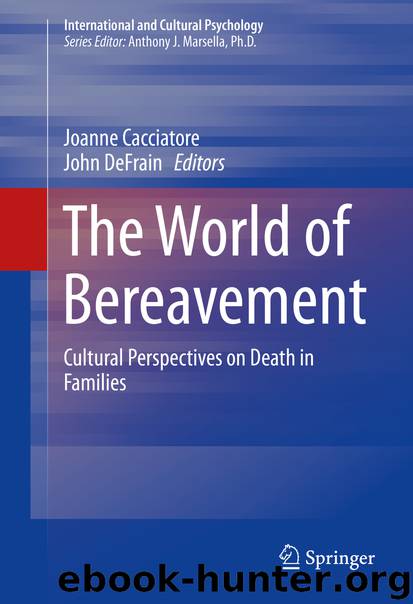The World of Bereavement by Joanne Cacciatore & John DeFrain

Author:Joanne Cacciatore & John DeFrain
Language: eng
Format: epub
Publisher: Springer International Publishing, Cham
Some Specific Regional Meanings Related to Death and Bereavement
A very different attitude is found in tribal and traditional societies, where the focus is not on the individual, but the relationships between individuals. In these societies, there is an important relationship to the dead, which are systematically invoked, mourned, remembered, honored, without embarrassment by society. This arises from a deep silence about death as an isolated event, and as a definitive instrument of discontinuity. This silence undoubtedly served to fuel the social prejudices against them as “primitive” societies that could not understand the distinctions in relational systems, where death is dealt with in a different manner. A fundamental attitude in regard to death and the dead makes ongoing social relations much more important than the dead, and the living stay together and keep indissoluble links.
In the northeast and the central regions of Brazil, we find an approach to family life that is more interested in family matters, in community issues. Their rituals are traditionally performed, in a way that facilitates attendance for those who have come a long way. A typical ritual is described by Silva (2000), in the rural area of the state of Alagoas. Two different rituals, actually, divided by the economic condition of the family, are present there. For those families who can afford the expenses of a funeral, the procession with the coffin goes from the house of the deceased to the church for the mass. After that, the priest leads the procession to the cemetery, while the church bell rings all day long. For those families who cannot afford the funeral, the body is taken in community-owned coffin, without passing by the church and straight to the cemetery, where it is put in a pit, covered with earth by the same people who carried it, and then the empty coffin is available for the next body.
This is what is expected to be done, according to rules that do not have to be written to be respected. They are transmitted from generation to generation, by means of a vicarious learning and, if anything goes different, a strong impact can be expected over the bereavement process. The main reason is that the rituals are the most secure way to guarantee that the dead is happy with the behavior of his or her family, and will rest in peace and in addition will do some favor in interceding for them, asking blessings from God. If not, the soul can come back to haunt those that did not behave as expected by the tradition.
DaMatta (1997) stresses that in Brazil, we speak more of the dead than of death. That implies a strange contradiction, because speaking of the dead is already a subtle and disguised way of denying death, thus prolonging the memory of the dead and giving the perception of a living reality.
Long before being aware that death means non-being and nothingness, most Brazilians become aware of the death of their family, home, neighborhood, community, nation, and century. These “people”
Download
This site does not store any files on its server. We only index and link to content provided by other sites. Please contact the content providers to delete copyright contents if any and email us, we'll remove relevant links or contents immediately.
The Art of Thinking Clearly by Rolf Dobelli(8842)
Mindhunter: Inside the FBI's Elite Serial Crime Unit by John E. Douglas & Mark Olshaker(7834)
Change Your Questions, Change Your Life by Marilee Adams(6641)
Nudge - Improving Decisions about Health, Wealth, and Happiness by Thaler Sunstein(6633)
Mastermind: How to Think Like Sherlock Holmes by Maria Konnikova(6236)
The Power of Now: A Guide to Spiritual Enlightenment by Eckhart Tolle(4755)
Men In Love by Nancy Friday(4323)
Factfulness: Ten Reasons We're Wrong About the World – and Why Things Are Better Than You Think by Hans Rosling(4021)
The Confidence Code by Katty Kay(3566)
Thinking in Bets by Annie Duke(3531)
Man and His Symbols by Carl Gustav Jung(3315)
Three Women by Lisa Taddeo(2920)
The Worm at the Core by Sheldon Solomon(2917)
Why Buddhism is True by Robert Wright(2826)
Liar's Poker by Michael Lewis(2811)
The Inner Life of Animals by Peter Wohlleben(2766)
Descartes' Error by Antonio Damasio(2731)
The Power of Mindful Learning by Ellen J. Langer(2710)
The Slow Fix: Solve Problems, Work Smarter, and Live Better In a World Addicted to Speed by Carl Honore(2574)
